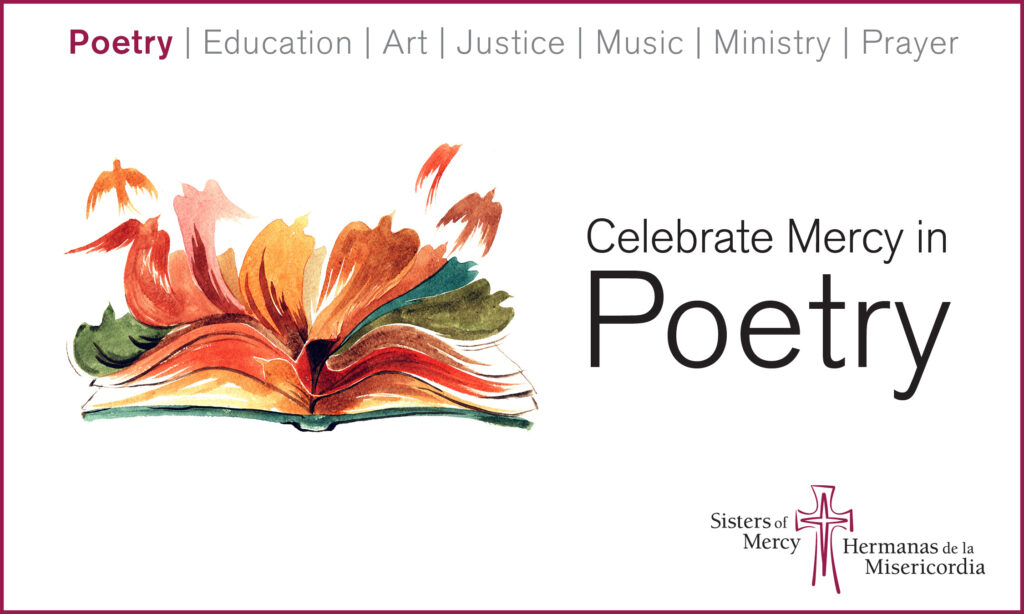On September 24, we will celebrate the 195th anniversary of the day Catherine McAuley opened the doors of the House of Mercy on Baggot Street. This began her ministry of serving the poor, the sick, and those in need of education. Beginning on September 17, we will “Celebrate Mercy” in history, poetry, education, art, justice, music, ministry, and prayer through reflections written by sisters.

My Last Sweet Breath
by Sister Mary Bilderback
Click here to listen to the author read this poem.
When death comes, as she will
I hope she smells like she just came in from the garden
with a pearly cobweb caught in her hair
and a fallen leaf stuck to the bottom of her bare foot.
And if she’s slightly out of breath
from tending the roses way up on the hill
when she sits down near me
I can share
my last breath
with her
and lighten the labor
she has come
to do.
Time to Go
by Sister Mary Bilderback
Click here to listen to the author read this lyric essay.
A bee stopped me on my way to the ocean this morning. “Taste this,” she said,
backing out of the squat yellow bunker of a primrose, and giddily bouncing from one startled spire of lavender to another.
I alone her witness. Nothing between her hunger and this sticky galaxy of nectar—
my garden—home to her tiny star.
Here no laws except desire. No troublesome thinking to wrench spirit from wing. No caveats except the bulk of pollen sacks soon to hobble her knees.
What a cargo to be brought down by—the weighty lift of summer gold—bequeathed to life that wouldn’t be conceived without her.
Without her.
Without her, and her kind? Grains slack, fruit trees molder.
Sorry, tiny Buzzer.
With galaxies galore the planet that created you is this one.
Citizen of summer. Alchemist of mud and meadow. Nectar sipper.
So long, and thanks for all the honey.
Where will you go to give your love away?
A block away at the ocean, I met Savanah visiting from Seattle. She was standing on one leg atop a pile of jetty stones with the other leg pointing toward the sky. An open compass. She may have heard the shriek of my delight. Hopping off the rocks, she came near me and I asked:
“Are you a post-modern mermaid?” She laughed and told me she had plans to join the circus—was studying to be a contortionist. Wow! I told her I was a contortionist, too.
Circus folk immediately get along.We had a deep exchange about breath. She told me how she centers herself and then can push past the fear even when she’s asking her body to be in impossible situations.
“You tell it it’s safe, give it breath.”
“Fill every cell,” I added. She nodded; we knew we were talking shop.
Whether tossing limbs or lyrics in the air, landing in a ring of fire or a rhyme, every gasp goes up to God.
“At the end of the day,” she said, tucking hair into floppy hat, “you have yourself.”
And I said yes, as we turned to face the diligent horizon.
Then she said, “I’m so happy today.”
And the Ocean swelled as big as sky. One seamless blue immensity in which we bowed farewell.
And I said, “I will never forget you.”
Strangers have a way of opening into the vast in-dwelling of each other. That huge room in which we may never meet again. Yet meeting once like that—meeting never ends—carries on inside us—swells like prayer.
“To pray is to know how to stand still,” wrote Rabbi Heschel, “and dwell upon one word.” On one leg, I might add. In one eternal moment.
Years ago on the first evening of a week-long grief retreat, spiritual teacher Joanna Macy invited each participant into the center of a huge gathering room to name the loss of someone dear to us.
Then she read a litany of beasts we’re losing. “Short-tailed albatross, whooping crane, gray wolf, peregrine falcon, hawkbill turtle, jaguar, rhinoceros, honey bee…”
We filled the room with raw grief, unmitigated, unsoothed. Then in silence we all went off to bed.
Early next morning there was a knock at my door. The receptionist read a message from the retreat house phone. “Mother fell. Brain surgery at noon. Come home soon.”
I had driven eight hours from southern New Jersey to northwestern Massachusetts with the navigational help of a college student enrolled in the workshop—no GPS back then. We’d had a delightful trip, discovered shared interests, passions, and concerns. He’d manned the maps thru unknown terrain, winding highways and snow-coated mountains.
As I repacked my knapsack, I wondered how I could possibly get home without him. I hadn’t memorized the route. I was still full of the collective grief the group had poured out the night before. I felt impossibly heavy, anxious about my mother and scared about whether I could find my way home—in time. In time for what?
Just as I got to my car, Joanna appeared with a paper bag and bright smile. She put the breakfast bag in my car, took my head in her hands, raised my forehead to hers.
Eternity slips through time’s cupped hands; we sip but cannot hold it.
It knows we’ll all get home in time. In time for what? Seems like we’ve lost so much, so many already.
Seems like loss is the depth to which love must go to understand itself.
“Listen: Be care-full. It’s time to go where you need to go to give your love away.”
“Describe your creative process.”
Click here to listen to the author talk about her creative process.